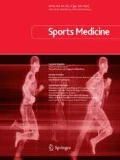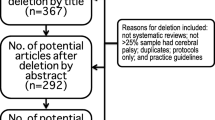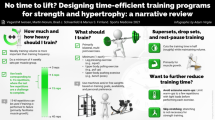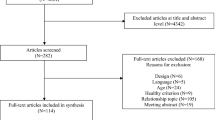Abstract
Background
Fundamental movement skills (FMS) are assumed to be the basic prerequisite motor movements underpinning coordination of more integrated and advanced movement capabilities. FMS development and interventions have been associated with several beneficial health outcomes in individual studies.
Objective
The primary aim of this review was to identify FMS intervention characteristics that could be optimised to attain beneficial outcomes in children and adolescents, while the secondary aim was to update the evidence as to the efficacy of FMS interventions on physiological, psychological and behavioural health outcomes.
Methods
A systematic search [adhering to Preferred Reporting Items for Systematic Reviews and Meta-Analyses (PRISMA) guidelines] was conducted in seven databases. Studies were included if they conducted an FMS intervention and targeted at least one physiological, behavioural or psychological outcome in school-aged children (5–18 years).
Results
Twenty-nine studies examining the effect of FMS interventions relative to controls were identified. Specialist-led interventions, taught in conjunction with at-home practice and parent involvement, appeared more efficacious in enhancing FMS proficiency than school physical education alone. Intervention environments encouraging psychological autonomy were likely to enhance perceived and actual competence in FMS alongside physical activity. FMS interventions had little influence on overweight/obesity reduction, strength or flexibility. In 93% of studies, evidence indicated interventions improved FMS motor proficiency. Favourable specific physiological, psychological and behavioural outcomes were also identified across a variety of interventions.
Conclusion
With reference to clinical and normative school-age populations, future studies should be directed toward determining validated standard FMS assessments to enable accurate effect estimates, permit intervention comparisons and improve the efficacy of FMS development.

Similar content being viewed by others
References
Cliff DP, Okely AD, Morgan PJ, et al. Proficiency deficiency: mastery of fundamental movement skills and skill components in overweight and obese children. Obesity. 2012;20(5):1024–33.
Cools W, De Martelaer KD, Samaey C, et al. Movement skill assessment of typically developing preschool children: a review of seven movement assessment tools. J Sport Sci Med. 2009;8:154–68.
Akbari H, Abdoli B, Shafizadeh M, et al. The effect of traditional games in fundamental motor skill development in 7–9 year-old boys. Iran J Pediatr. 2009;19(2):123–9.
Lyoka PA. Relationship between factors of neuromotor fitness and children’s indigenous games: linkage with fundamental motor skills. S Afr J Res Sport Phys Educ Recr. 2011;33(2):95–106.
Mitchell B, McLennan S, Latimer K, et al. Improvement of fundamental movement skills through support and mentorship of class room teachers. Obes Res Clin Pract. 2013;7(3):e230–4.
Okely AD, Booth ML. Mastery of fundamental movement skills among children in New South Wales: prevalence and sociodemographic distribution. J Sci Med Sport. 2004;7(3):358–72.
Hume C, Okely A, Bagley S, et al. Does weight status influence associations between children’s fundamental movement skills and physical activity? Res Q Exerc Sport. 2008;79:158–65.
Rudd J, Butson ML, Barnett L, et al. A holistic measurement model of movement competency in children. J Sport Sci. 2016;34(5):477–85.
Zuvela F, Bozanic A, Miletic D. Polygon—a new fundamental movement skills test for 8 year old children: construction and validation. J Sport Sci Med. 2011;10(1):157–63.
Bardaglio G, Settanni M, Marasso D, et al. The development and Rasch calibration of a scale to measure coordinative motor skills in typically developing children. Adv Phys Educ. 2012;02(03):88–94.
Ericsson I. Motor skills, attention and academic achievements. An intervention study in school years 1–3. Br Educ Res J. 2008;34(3):301–13.
Hardy LL, Barnett L, Espinel P, et al. Thirteen-year trends in child and adolescent fundamental movement skills: 1997–2010. Med Sci Sports Exerc. 2013;45(10):1965–70.
Dudley D, Okely AD, Pearson P, et al. A systematic review of the effectiveness of physical education and school sport interventions targeting physical activity, movement skills and enjoyment of physical activity. Eur Phys Educ Rev. 2011;17(3):353–78.
Holfelder B, Schott N. Relationship of fundamental movement skills and physical activity in children and adolescents: a systematic review. Psychol Sport Exerc. 2014;15(4):382–91.
Lubans DR, Morgan PJ, Cliff DP, et al. Fundamental movement skills in children and adolescents. Sports Med. 2010;40(12):1019–35.
Hallal PC, Andersen LB, Bull FC, et al. Global physical activity levels: Surveillance progress, pitfalls, and prospects. Lancet. 2012;380(9838):247–57.
Hills AP, King NA, Armstrong TP. The contribution of physical activity and sedentary behaviours to the growth and development of childrenand adolescents. Sports Med. 2007;37(6):533–45.
Barnett LM, van Beurden E, Morgan PJ, et al. Childhood motor skill proficiency as a predictor of adolescent physical activity. J Adolesc Health. 2009;44:252–9.
Jaakkola T, Yli-Piipari S, Huotari P, et al. Fundamental movement skills and physical fitness as predictors of physical activity: a 6-year follow-up study. Scand J Med Sci Sports. 2016;26(1):74–81.
Stodden DF, Goodway JD, Langendorfer SJ, et al. A developmental perspective on the role of motor skill competence in physical activity: an emergent relationship. Quest. 2008;60(2):290–306.
Get skilled: Get active. NSW Department of Education and Training; 2000.
The national curriculum in England. Department for Education; 2013.
Bebich-Philip MD, Thornton AL, Reid SL, et al. Adaptation of the Resistance Training Skills Battery for use in children across the motor proficiency spectrum. Pediatr Exerc Sci. 2016;28(3):473–80.
Personal development, health and physical education K-6: syllabus. Sydney, NSW: Board of Studies, Teaching and Educational Standards NSW; 2007.
Barnett LM, Lai SK, Veldman SL, et al. Correlates of gross motor competence in children and adolescents: a systematic review and meta-analysis. Sports Med. 2016;46(11):1663–88.
Graf C, Koch B, Falkowski G, et al. Effects of a school-based intervention onBMI and motor abilities in childhood. J Sports Sci Med. 2005;4(3):291–9.
Cliff DP, Okely AD, Morgan PJ, et al. Movement skills and physical activity in obese children: randomized controlled trial. Med Sci Sports Exerc. 2011;43(1):90–100.
D’Hondt E, Gentier I, Deforche B, et al. Weight loss and improved gross motor coordination in children as a result of multidisciplinary residential obesity treatment. Obesity. 2011;19(10):1999–2005.
Renshaw I, Chow JY, Davids K, et al. A constraints-led perspective to understanding skill acquisition and game play: a basis for integration of motor learning theory and physical education praxis? Phys Educ Sport PED. 2010;15(2):117–37.
Kirk D. Sport education, critical pedagogy, and learning theory: Toward an intrinsic justification for physical education and youth sport. Quest. 2006;58:255–64.
Morgan PJ, Barnett LM, Cliff DP, et al. Fundamental movement skill interventions in youth: A systematic review and meta-analysis. Pediatrics. 2013;132(5):e1361–83.
Liberati A, Altman DG, Tetzlaff J, et al. A statement for reporting systematic reviews and meta-analyses of studies that evaluate health care interventions: explanation and elaboration. PLoS Med. 2009;6(7):e1000100.
Higgins JP, Altman DG, Gotzsche PC, et al. The Cochrane Collaboration’s tool for assessing risk of bias in randomised trials. BMJ. 2011;343:d5928.
Vandenbrouke JP, von Elme E, Altman DG, et al. STROBE initiative. Int J Surg. 2014;12:1500–24.
Schulz KF, Altman DG, Moher D. CONSORT 2010 statement: Updated guidelines for reporting parallel group randomized trials. Ann Intern Med. 2010;152(11):726–32.
Boyle-Holmes T, Grost L, Russell L, et al. Promoting elementary physical education: results of a school-based evaluation study. Health Educ Behav. 2010;37(3):377–89.
Matvienko O, Ahrabi-Fard I. The effects of a 4-week after-school program on motor skills and fitness of kindergarten and first-grade students. Am J Health Promot. 2010;24(5):299–303.
Graf C, Dordel S. The CHILT I project (Children’s Health Interventional Trial). A multicomponent intervention to prevent physical inactivity and overweight in primary schools. Bundes Ges Und Heitsbla. 2011;54(3):313–21.
Kalaja SP, Jaakkola TT, Liukkonen JO, et al. Development of junior high school students’ fundamental movement skills and physical activity in a naturalistic physical education setting. Phys Educ Sport PED. 2012;17(4):411–28.
Fahimi M, Aslankhani MA, Shojaee M, et al. The effect of four motor programs on motor proficiency in 7–9 years old boys. Middle East J Sci Res. 2013;13(11):1526–32.
Ferguson GD, Jelsma D, Jelsma J, et al. The efficacy of two task-orientated interventions for children with developmental coordination disorder: neuromotor task training and Nintendo Wii fit training. Res Dev Disabil. 2013;34(9):2449–61.
Jurak G, Cooper A, Leskosek B, et al. Long-term effects of 4-year longitudinal school-based physical activity intervention on the physical fitness of children and youth during 7-year followup assessment. Central Eur J Public Health. 2013;21(4):190–5.
Morano M, Colella D, Rutigliano I, et al. A multi-modal training programme to improve physical activity, physical fitness and perceived physical ability in obese children. J Sports Sci. 2014;32(4):345–53.
Cohen KE, Morgan PJ, Plotnikoff RC, et al. Improvements in fundamental movement skill competency mediate the effect of the scores intervention on physical activity and cardiorespiratory fitness in children. J Sports Sci. 2015;33(18):1908–18.
Cohen KE, Morgan PJ, Plotnikoff RC, et al. Physical activity and skills intervention: SCORES cluster randomized controlled trial. Med Sci Sports Exerc. 2015;47(4):765.
Miller A, Christensen EM, Eather N, et al. The PLUNGE randomized controlled trial: evaluation of a games-based physical activity professional learning program in primary school physical education. Prev Med. 2015;74:1–8.
Straker L, Howie E, Smith A, et al. A crossover randomised and controlled trial of the impact of active video games on motor coordination and perceptions of physical ability in children at risk of developmental coordination disorder. Hum Mov Sci. 2015;42:146–60.
Vernadakis N, Papastergiou M, Zetou E, et al. The impact of an exergame-based intervention on children’s fundamental motor skills. Comput Educ. 2015;83:90–102.
Jarani J, Grøntved A, Muca F, et al. Effects of two physical education programmes on health- and skill-related physical fitness of Albanian children. J Sports Sci. 2016;34(1):35–46.
Larsen KT, Huang T, Larsen LR, et al. The effect of a multi-component camp-based weight-loss program on children’s motor skills and physical fitness: a randomized controlled trial. BMC Pediatr. 2016;16:91.
Pesce C, Masci I, Marchetti R, et al. Deliberate play and preparation jointly benefit motor and cognitive development: mediated and moderated effects. Front Psychol. 2016;7:349.
Smits-Engelsman BCM, Jelsma LD, Ferguson GD. The effect of exergames on functional strength, anaerobic fitness, balance and agility in children with and without motor coordination difficulties living in low-income communities. Hum Mov Sci. 2016. doi:10.1016/j.humov.2016.07.006.
Sollerhed A, Ejlertsson G. Physical benefits of expanded physical education in primary school: Findings from a 3-year intervention study in Sweden. Scand J Med Sci Sports. 2008;18(1):102–7.
Salmon J, Ball K, Hume C, et al. Outcomes of a group-randomized trial to prevent excess weight gain, reduce screen behaviours and promote physical activity in 10-year-old children: switch-play. Int J Obes (Lond). 2008;32(4):601–12.
Graf C, Koch B, Falkowski G, et al. School-based prevention: Effects on obesity and physical performance after 4 years. J Sports Sci. 2008;26(10):987–94.
Foweather L, McWhannell N, Henaghan J, et al. Effect of a 9-wk. after-school multiskills club on fundamental movement skill proficiency in 8- to 9-yr.-old children: an exploratory trial. Percept Motor Skills. 2008;106(3):745–54.
Cliff DP, Wilson A, Okely AD, et al. Feasibility of SHARK: A physical activity skill-development program for overweight and obese children. J Sci Med Sport. 2007;10(4):263–7.
Karabourniotis D, Evaggelinou C, Tzetzis G, et al. Curriculum enrichment with self-testing activities in development of fundamental movement skills of first-grade children in Greece. Percept Motor Skills. 2002;94:1259–70.
Anderson LB, Anderson TE, Anderson E, et al. An intermittent running test to estimate maximal oxygen uptake: the Andersen test. J Sport Med Phys Fitness. 2008;48:434–7.
Faigenbaum AD, Myer GD, Farrell A, et al. Integrative neuromuscular training and sex-specific fitness performance in 7-year-old children: an exploratory investigation. J Athl Train. 2014;49(2):145–53.
Rainer P, Cropley B, Jarvis S, et al. From policy to practice: the challenges of providing high quality physical education and school sport faced by head teachers within primary schools. Phys Educ Sport PED. 2012;17(4):429–46.
Starc G, Strel J. Influence of the quality implementation of a physical education curriculum on the physical development and physical fitness of children. BMC Public Health. 2012;12:61.
Tsangaridou N. Educating primary teachers to teach physical education. Eur Phys Educ Rev. 2012;18(3):275–86.
Beets MW, Cardinal BJ, Alderman BL. Parental social support and the physical activity-related behaivours of youth: a review. Health Educ Behav. 2010;37(5):621–44.
Barnett LM, Ridgers ND, Salmon J. Associations between young children’s percieved and actual ball skill competence and physical activity. J Sci Med Sport. 2015;18(2):167–71.
Logan SW, Webster EK, Getchell N, et al. Relationship between fundamental motor skill competence and physical activity during childhood and adolescence: a systematic review. Kinesiol Rev. 2015;4(4):416–26.
Robinson L, Stodden D, Barnett L, et al. Motor competence and its effect on positive developmental trajectories of health. Sports Med. 2015;45(9):1273–84.
Larsen KT, Huang T, Moller NC, et al. Effectiveness of a one-year multi-component day-camp intervention for overweight children: study protocol of the Odense Overweight Intervention Study (OOIS). BMC Public Health. 2014;14:313.
Straker LM, Campbell AC, Jensen LM, et al. Rationale, design and methods for a randomised and controlled trial of the impact of virtual reality games on motor competence, physical activity, and mental health in children with developmental coordination disorder. BMC Public Health. 2011;11:654.
Author information
Authors and Affiliations
Corresponding author
Ethics declarations
Funding
No funding supporting the preparation of this submission was received.
Conflict of interest
Claire Tompsett, Ross Sanders, Caitlin Taylor and Stephen Cobley declare that they have no conflicts of interest relevant to the content of this review.
Rights and permissions
About this article
Cite this article
Tompsett, C., Sanders, R., Taylor, C. et al. Pedagogical Approaches to and Effects of Fundamental Movement Skill Interventions on Health Outcomes: A Systematic Review. Sports Med 47, 1795–1819 (2017). https://doi.org/10.1007/s40279-017-0697-z
Published:
Issue Date:
DOI: https://doi.org/10.1007/s40279-017-0697-z




